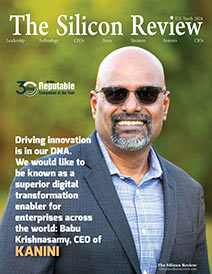10 fastest growing robotics companies 2017
New automation solutions for The changing world: OMRON
The Silicon Review
![]()
‘A corporate culture focused on innovation and creativity culminating in a brand that is synonymous with quality throughout the world.’
Omron Corporation is a global leader in the field of automation based on its core technology of sensing and control, based in Kyoto, Japan. OMRON has about 38,000 employees worldwide, working to provide products and services in more than 110 countries.
Omron was established by Kazuma Tateishi in 1933 (as the Tateisi Electric Manufacturing Company) and incorporated in 1948. The company originated in an area of Kyoto called "Omuro", from which the name "OMRON" was derived. Prior to 1990, the corporation was known as Omron Tateisi Electronics. During the 1980s and early 1990s, the company motto was: "To the machine the work of machines, to man the thrill of further creation".
Omron's primary business is the manufacture and sale of automation components, equipment and systems, but it is generally known for medical equipment such as digital thermometers, blood pressure monitors and nebulizers. Omron developed the world's first electronic ticket gate, which was named an IEEE Milestone in 2007, and was one of the first manufacturers of automated teller machines (ATM) with magnetic stripe card readers.
Omron's Sensing and Control technologies make it possible to extract necessary data from a vast range of detected information, such as movement, location, biometrics, facial expressions, and environmental conditions, and convert this data into highly valuable information, based on which, machines can be precisely and optimally controlled and programmed to make automatic judgments with a degree of sophistication that approaches that of humans.
In 1952, OMRON founder Kazuma Tateisi encountered two new concepts: automation and cybernetics. He first heard the word "automation" during a meeting with Professor Yoichi Ueno, known as the "Father of Japanese Administrative Science."
Development of an automated cash dispenser
In 1965, OMRON developed an automated vending machine capable of accepting credit cards in cooperation with Automatic Canteen Co., then the largest vending machine manufacturer in the United States. Subsequently, OMRON went on to develop new card systems, installing an off-line automated cash dispenser, which used a magnetic card, at Sumitomo Bank in 1969. In 1971, we delivered the world's first on-line automated cash dispenser to the central branch of Mitsubishi Bank. These developments became the basis for today's magnetic card systems and marked the beginning of a "cashless age" in Japan.
Insight into the Future of Society, Science and Technology
In the late 1960s, OMRON began to focus on the future development of society, science and technology. Company founder Kazuma Tateisi had a strong belief that the company must have foresight in addition to technological prowess in order to continue assessing and meeting the needs of society, and in order for Japan to become on the world's advanced nations. A study group was formed in 1967 to research future prediction techniques, giving rise to the SINIC (Seed-Innovation to Need-Impetus Cyclic Evolution) theory. The theory was presented at the International Future Research Conference in 1970, where it was enthusiastically accepted.
Beginning in the 1970s, computer technology quickly spread throughout both industry and society at large. The interaction between computer, communications and control technologies lead to the diversification of requirements for machines. Faced with increasingly sophisticated technological challenges, OMRON focused its efforts on the development of the SINIC Theory, SYSMAC programmable logic controller, fuzzy logic and image processing technology with the ultimate aim of creating a new kind of interaction between people and machines.
The SINIC Theory
According to the SINIC theory, science, technology and society have a cyclical relationship, in which each area impacts and influences the others in two ways. In one direction, scientific breakthroughs yield new technologies, which stimulate societal advancement. In the other direction, societal needs motivate technological developments and expectations for new scientific advancement. All of these factors affect each other in a cyclical manner, prompting society to evolve.
Addressing Environmental Issues through OMRON Sensing and Control Technology
As the concern for climate change and other environmental issues rises globally, OMRON set up the Environmental Solutions Business Headquarters in 2009 to make a full-scale entry into the environmental business, with increasing expectations of growth. Along with the supply of individual energy-saving products, such as power monitoring devices, power sensors and DC relays, OMRON also strived to promote solutions intended to conserve and generate energy. As part of this drive, OMRON introduced the "e-watching" CO2 visualization system and consultation service by combining a range of OMRON's environmental devices. In 2010, OMRON also developed a new "ene-brain" CO2 visualization system capable of automatically analyzing areas for potential energy consumption reduction, the first of its kind in the world.
Value Generation 2020
In July 2011, OMRON announced its new long-term strategy for the decade up to 2020, called the "Value Generation 2020 (VG2020)." VG2020 is divided into two separate stages: the Globe Stage and the Earth Stage. In the Globe Stage (2011 through 2013), OMRON has been striving for growth in the global market, while also strengthening its earnings structure. In the Earth Stage (2014 through 2020), OMRON will work on generating new value from the "Planet Earth" perspective. Through these two stages, OMRON will accelerate business growth and offer new benefits to more customers worldwide.
Meet the Key Executive
Yoshihito Yamada, President and CEO: Mr. Yoshihito Yamada has been the Chief Executive Officer and President at Omron Corporation since June 2011. He is on the Board of Directors at OMRON Corp.
Mr. Yamada was previously employed as Chairman by Nippon Electric Control Equipment Industries Association, Chief Executive Officer by Omron Healthcare UK Ltd., and President and Chief Executive Officer by Omron Personnel Service Co., Ltd.
He received his undergraduate degree from Doshisha University.
“A company is most valuable when it contributes to society beyond the simplest pursuit of profits.”









